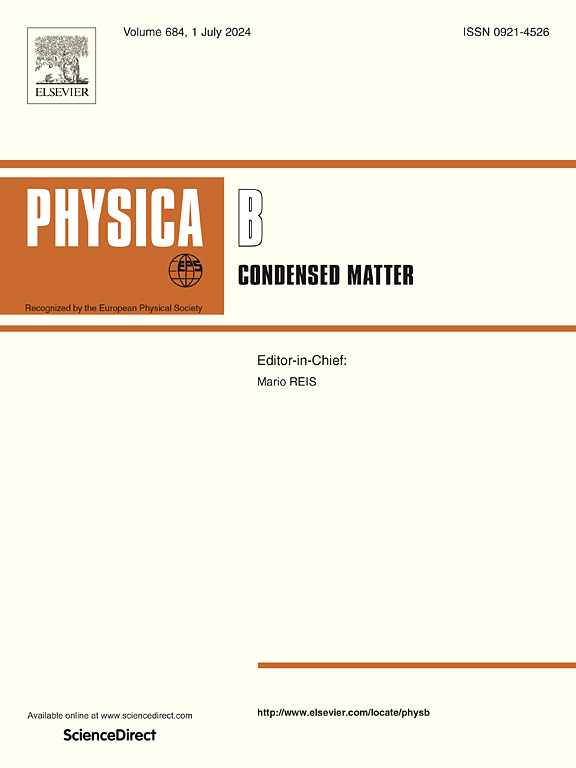同时增强 W5+ 植入 WO3-x 薄膜电极的可见光吸收和储能性能
IF 2.8
3区 物理与天体物理
Q2 PHYSICS, CONDENSED MATTER
引用次数: 0
摘要
在此,我们报告了在电镀 WO3 薄膜电极中植入氧空位掺杂剂以增强能源和环境应用的情况。植入方法包括在硼氢化钠中进行部分脱氧,从而在 WO3 电极中引入氧空位。掺杂的 WO3-x 显示出显著降低的 2.11 eV 平均带能,表明其能够吸收 75% 以上的可见光光谱。此外,用 WO3-x 负极组装的薄膜非对称超级电容器的面积电容提高到 1.15 mFcm-2,能量密度提高到 0.33 μWhcm-2,而在 25 μAcm-2 下循环时的功耗为 17.50 μWcm-2。我们的溶液加工技术可在各种基底上实现可控的空位植入和 WO3-x 无粘结剂涂层。它大大缩短了加工时间,能耗低,是提高基于 WO3 的电极的整体光电转换和储能性能的一种实用而高效的方法。本文章由计算机程序翻译,如有差异,请以英文原文为准。
Simultaneous enhancement of visible light absorption and energy storage performances of W5+ implanted WO3-x thin film electrodes
Herein, we report the implantation of oxygen vacancy dopants in electro-coated WO3 thin film electrodes for enhanced energy and environmental applications. The implantation method involved partial de-oxidation in sodium borohydride to introduce oxygen vacancies into the WO3 electrodes. The doped WO3-x demonstrated a significantly lowered average band energy of 2.11 eV, indicating its ability to absorb over 75 % of the visible light spectrum. Moreover, a thin film asymmetric supercapacitor assembled with WO3-x negatrode demonstrated an improved areal capacitance of 1.15 mFcm−2 and energy density of 0.33 μWhcm−2 while consuming power at 17.50 μWcm−2 when cycled at 25 μAcm−2. Our solution-processed technique allows for controllable vacancy implantation and binder-free coating of WO3-x on various substrates. It significantly reduces the processing time and requires low energy consumption, making it a practical and efficient method for enhancing the overall photo-conversion and energy storage performances of WO3-based electrodes.
求助全文
通过发布文献求助,成功后即可免费获取论文全文。
去求助
来源期刊

Physica B-condensed Matter
物理-物理:凝聚态物理
CiteScore
4.90
自引率
7.10%
发文量
703
审稿时长
44 days
期刊介绍:
Physica B: Condensed Matter comprises all condensed matter and material physics that involve theoretical, computational and experimental work.
Papers should contain further developments and a proper discussion on the physics of experimental or theoretical results in one of the following areas:
-Magnetism
-Materials physics
-Nanostructures and nanomaterials
-Optics and optical materials
-Quantum materials
-Semiconductors
-Strongly correlated systems
-Superconductivity
-Surfaces and interfaces
 求助内容:
求助内容: 应助结果提醒方式:
应助结果提醒方式:


